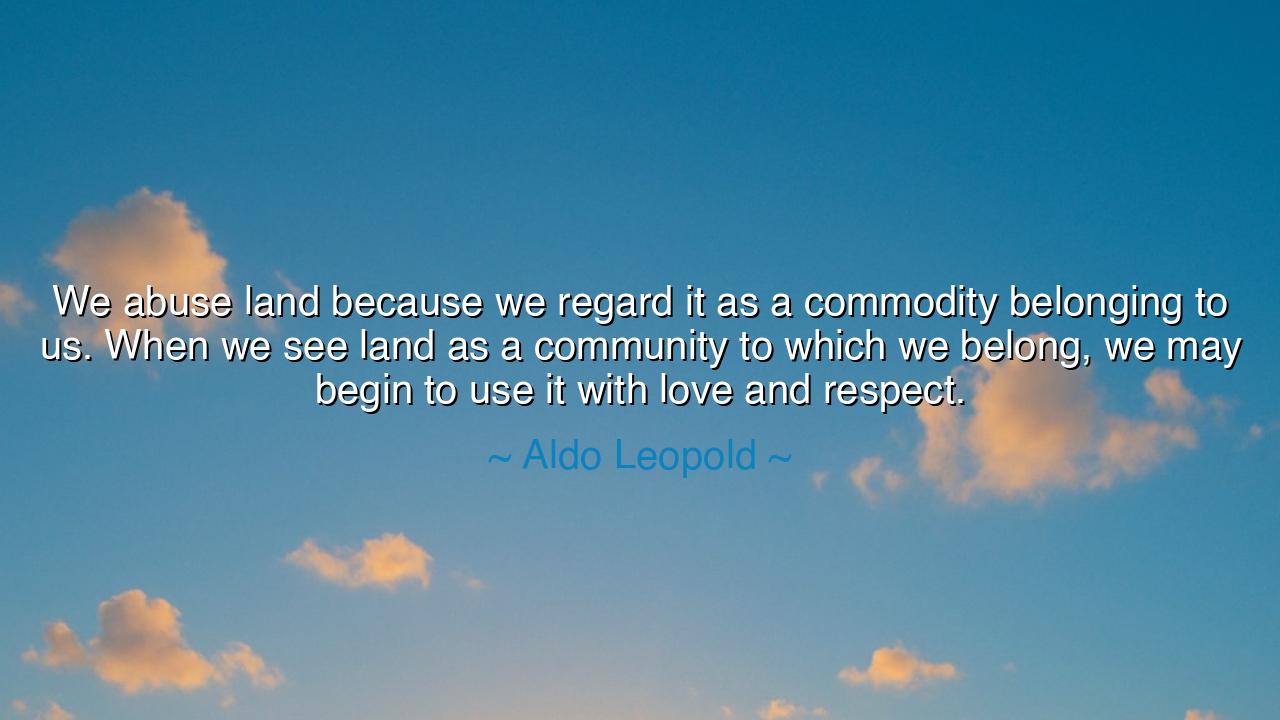
We abuse land because we regard it as a commodity belonging to
We abuse land because we regard it as a commodity belonging to us. When we see land as a community to which we belong, we may begin to use it with love and respect.






Hear the words of Aldo Leopold, prophet of the earth and herald of the land’s dignity: “We abuse land because we regard it as a commodity belonging to us. When we see land as a community to which we belong, we may begin to use it with love and respect.” These words are not merely about soil and stone; they are about the soul of humanity and its place within creation. For Leopold reminds us that the earth is not our servant, not our property, but our kin, our dwelling, our greater body. To treat it as a thing is to wound ourselves; to treat it as a community is to restore harmony.
The ancients knew this truth, though it has been forgotten in our age of consumption. The Native peoples of America called the earth “Mother,” for from her they received life and to her they returned in death. The Greeks revered Gaia, the living ground of all existence. The scriptures themselves declare, “The earth is the Lord’s and the fullness thereof.” These voices, like Leopold’s, warn us: to see the land as a commodity is to break faith with the sacred order of things. For in truth, we belong to the land more than it belongs to us.
Consider the story of the Dust Bowl in the 1930s. Farmers, driven by profit, stripped the land without care, plowing away its grasses and exhausting its soil. The result was devastation: winds carried the topsoil into black clouds, crops failed, families starved, and towns withered. This was not mere chance, but the consequence of treating land as possession rather than community. Had they honored it, cared for it, used it with respect, the soil might have endured. Instead, neglect and greed reaped ruin.
Yet history also gives us examples of restoration. In Japan, centuries-old traditions of satoyama—village landscapes balanced between forest and field—show how humans can live with the earth as community. There, the people cared for woodlands, streams, and rice paddies as parts of a living whole. This harmony provided sustenance for generations without destruction. It was not abuse, but love—a recognition that humans belong to the land’s circle of life. This is the vision Leopold sought: not domination, but belonging.
The meaning of his words strikes at the heart of our present age. We have turned rivers into sewers, forests into stumps, air into smoke. Why? Because we think of the world as a warehouse of resources, a commodity to be used and discarded. But if we awaken to the truth that we are part of a living community, then our use of the land will change. We will not exhaust it, for that would be to exhaust ourselves. We will not poison it, for that would be to drink our own poison. We will learn again to use it with love.
The lesson is both moral and urgent. Treat the land as you would your neighbor, your brother, your mother. Do not take more than it can give. Plant where you uproot, restore where you scar, protect where you build. Walk lightly upon the earth, remembering always that your life is bound to the soil, the water, the air. Respect is not weakness; it is wisdom, the only path by which life continues.
What then shall we do? Begin with small acts: plant trees, tend gardens, reduce waste, honor rivers and forests. Teach children not to see the world as a storehouse, but as a home. Support those who preserve and restore the land. And above all, cultivate in your heart the spirit of community with the earth, so that every action is shaped by the knowledge that you belong to it, and it to you.
Therefore, O listener, remember the words of Aldo Leopold: “We abuse land when we see it as commodity; we honor it when we see it as community.” Carry this truth like a covenant. For only when we walk with love and respect upon the earth will we inherit a world worth giving to those yet to come.






AAdministratorAdministrator
Welcome, honored guests. Please leave a comment, we will respond soon